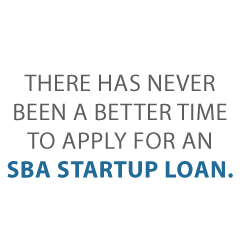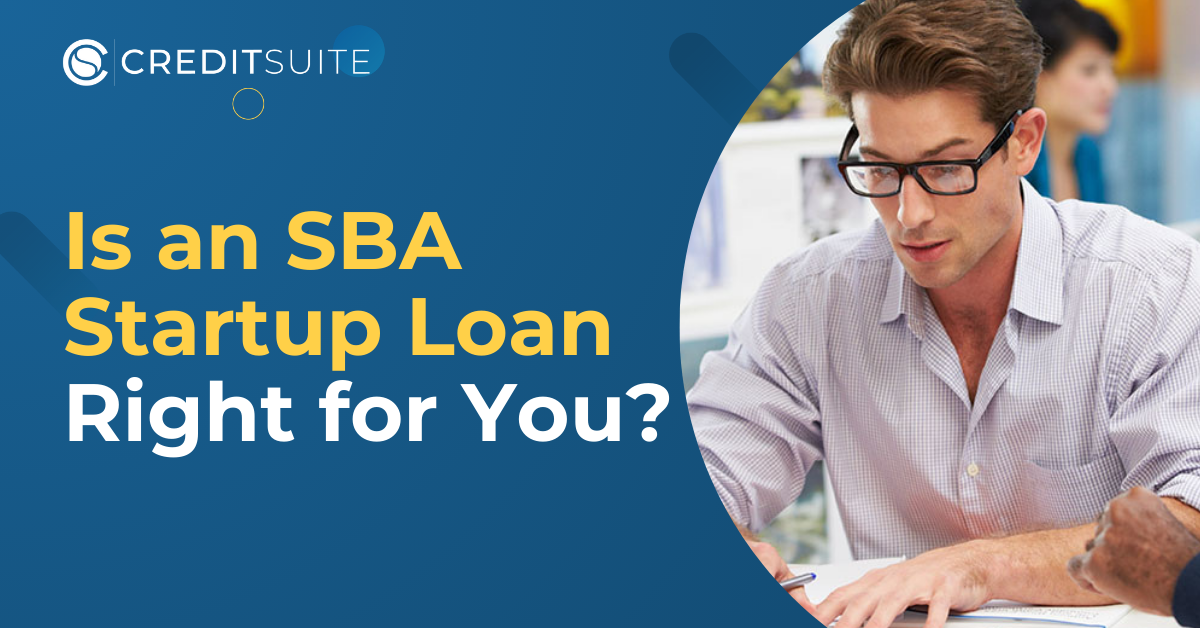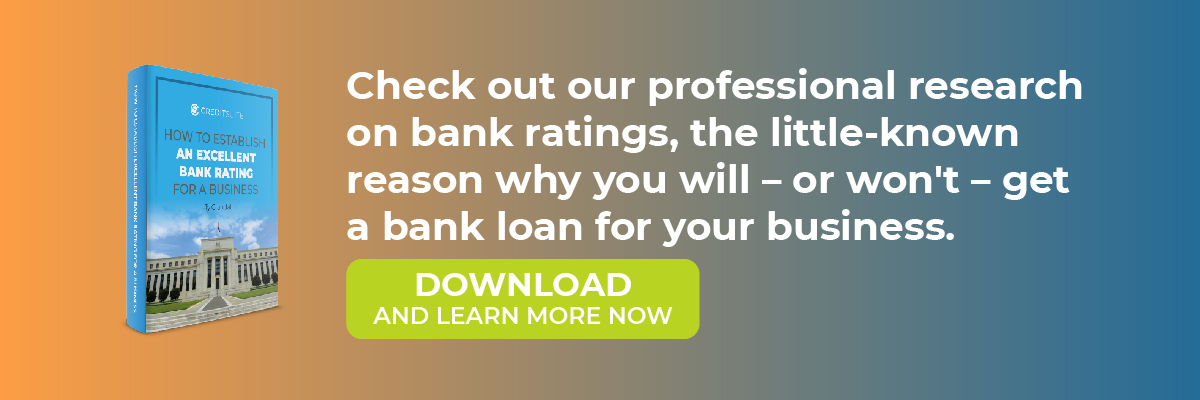Whether you are thinking of starting a business in recession chaos or during economic Shangri-La, an SBA startup loan could be just what you need to get up and going.
All You Need to Know About Getting an SBA Startup Loan, and Other Options for Right Now
The Small Business Administration is in the news big time right now in relation to COVID-19 relief for businesses. However, if you are looking to start a business, their SBA startup loan programs are still available.
SBA Startup Loans: Why SBA Loans?
SBA loans are small-business loans guaranteed by the Small Business Administration. The loans are issued by participating lenders, mostly banks. The guarantee can go up to 85% of a loan of $150,000 or less, and loans that are more than $150,000 they will guarantee up to 75%.
Who Qualifies for an SBA Startup Loan?
To be eligible for SBA Loans, you must meet certain qualifications. These include:
- Your business must be for profit.
- Your business must be inside the US.
- Business owners must invest equity.
- You must have exhausted all other financing options.
- Your business must qualify as a small business.
- Your business must be in an eligible industry.
Repaying an SBA Startup Loan
One perk of an SBA loan is that you get more time to pay it back than you would otherwise. According to the SBA, the terms depend on how you intend to use the funds.
For example, working capital loans, or funds you intend to use for daily operation, have a repayment term of seven years. However, funds for new equipment purchase have a term of 10 years, and real estate loan terms extend even longer to 25 years. Of course, the longer the term the lower the interest, which means lower regular payments.
How to Apply for an SBA Startup Loan
One of the downsides to SBA government loans is that they have a lengthy and somewhat complicated application process. There is a lot of red tape involved, but understandably so considering it is the federal government and they are guaranteeing a huge chunk of the loan.
Get Your Eggs in a Row
The first thing you have to do is gather the information you will need. This includes:
- The SBA borrower loan information form
- Statement of personal history
- Personal financial statement
- Personal income tax returns for the previous 3 years
- Tax returns for the business for the previous 3 years
- Business certificate or license
- Business lease
- Loan application history
This list, along with links to forms and templates, is available at SBA.gov. Once you have this information, you can start looking for a lender.
There may be more requirements based on your specific lender and what they deem necessary for your individual case. However, this is a general list to get you started.
Find an SBA Partner Lender
There is more than one way to go about this. The first way is to contact your SBA district office. You can find contact information through the website. Another option is to use the SBA lender match option on the website.
All you have to do is enter some basic information about your business and how you plan to use the funds. The tool then matches you with a list of potential lenders that could meet your needs.
Which Program Works Best for an SBA Startup Loan
Not all SBA loan programs work for startups. These are your best options. They want a 680 minimum FICO score.
SBA Startup Loan: 7(a) Loans
This is a cornerstone program for the SBA. It offers federally funded term loans of up to $5 million. Funds can be used for expansion, purchasing equipment, and working capital in addition to startup. Banks, credit unions, and other specialized institutions in partnership with the SBA process these loans and disburse the funds.
There is a required down payment of at least 10% for the purchase of a business, commercial real estate, or equipment. The minimum time in business is 2 years. If you are a startup, business experience equivalent to two years will serve this purpose.
SBA Startup Loan: 504 Loans
 These loans are also available up to $5 million. Funds can be used to purchase machinery, facilities, or land. They are generally used for expansion. Private sector lenders or nonprofits process and disburse funds. They work well for commercial real estate purchases especially.
These loans are also available up to $5 million. Funds can be used to purchase machinery, facilities, or land. They are generally used for expansion. Private sector lenders or nonprofits process and disburse funds. They work well for commercial real estate purchases especially.
Terms for 504 Loans range from 10 to 20 years, and funding can take from 30 to 90 days. Collateral is the asset the funds are financing. There is also a down payment requirement of 10%, which can increase to 15% for a new business.
There is also a requirement you be in business at least 2 years, or that management has equivalent experience if the business is a startup.
SBA Startup Loan: Microloans
Microloans are available in amounts up to $50,000. They work for starting a business purchasing equipment, buying inventory, or for working capital. Community based non-profits administer microloan programs as intermediaries, with financing coming directly from the Small Business Administration.
Interest rates on these loans are 7.75% to 8% above the lender’s cost to fund, and the terms go up to 6 years. They can take upwards of 90 days to fund. The minimum credit score is 640, and the collateral and down payment requirements vary by lender.
What If an SBA Startup Loan will Not Work?
What if, for some reason, an SBA startup loan will not work. Maybe you need collateral and do not have it? Perhaps you would rather not deal with down payment requirements. What if you need more funding? Here are some other options.
Alternative loans
These are loans that come through private lenders rather than banks. Most of these lenders operate online. The process is fast and simple. Typically, borrowers fill out an application online. Generally, they receive approval in as little as a few hours. Once approved, funds are often in the borrower’s account in as little as a day or two.
This fast, easy process makes these alternative loans attractive for business funding.
Is There a Catch to Alternative Small Business Loans?
If these alternative loans are so fast and easy, why even bother with traditional loans or even an SBA startup loan? There has to be some catch, right?. The catch is, interest rates and terms are considerably less favorable than those you may get with a traditional lender.
That’s because, in an effort to extend credit to those that do not qualify with a bank, alternative lenders have to be a little more relaxed with their eligibility requirements. As a result, they are taking on significantly more risk with their loans. To make up for this, they increase interest rates and loan terms to balance things out.
How do I Choose the Right Alternative Loan for Me?
Once you know you are in a position to need alternative small business loans, you can start looking for the right one for your situation. How do you do this? The key is to research, research, research. Extensive research is absolutely necessary to ensure you find the best fit for your business.
While many of them function the same with similar requirements, there are some vastly different and innovative platforms for these types of loans as well. Read all the reviews, but don’t forget to look at the actual lender websites too. Only you know your specific situation. Your credit score, how long you have been in business, and how much debt you can handle is information that you have at your disposal to help you make an informed decision..
How to Start Finding the Right Alternative Small Business Loans
Start by determining your eligibility factors. You may not be able to anticipate what every single lender will require. However, there are a few things that most lenders will want to know before approving a loan. Things such as credit score, annual revenue, and length of time in business are pretty common.
If you know your score and what your annual revenue is before you begin looking for alternative small business loans, you will be able to weed out the ones you do not qualify for from the beginning. There are so many that you will definitely see the need to do this.
Credit Line Hybrid
What if there were an option that allowed you to have an even better interest rate than a secured loan, and yet get the money faster and easier than any type of traditional funding. What if you could get business funding without having to supply any bank statements or credit stubs? Imagine that you could get funding in a few days rather than weeks without supplying any collateral or documents? This is exactly the credit line hybrid allows you to do.
What is a Credit Line Hybrid?
A credit line hybrid is basically revolving, unsecured financing. It allows you to fund your business without putting up collateral, and you only pay back what you use.
What are the Qualifications?
How hard is it to qualify? Not as hard as you may think. You do need good personal credit. That is, your personal credit score should be at least 700. In addition, you can’t have any liens, judgments, bankruptcies or late payments. Also, in the past 6 months, you should have less than 5 credit inquiries, and you should have less than a 45% balance on all business and personal credit cards. It’s also preferred that you have established business credit as well as personal credit.
If you do not meet all of the requirements, all is not lost. You can take on a credit partner that meets each of these requirements. Many business owners work with a friend or relative to fund their business. If a relative or a friend meets all of these requirements, they can partner with you to allow you to tap into their credit to access funding.
What are the Benefits of a Credit Line Hybrid?
There are many benefits to using a credit line hybrid. First, it is unsecured, meaning you do not have to have any collateral to put up. Next, the funding is “no-doc.” This means you do not have to provide any bank statements or financials.
Not only that, often you can get interest rates as low as 0% for the first few months, allowing you to put that savings back into your business.
The process is pretty fast, especially with a qualified expert to walk you through it. One other benefit is this. With the approval for multiple credit cards, competition is created. This makes it easier, and likely even if you handle the credit responsibly, that you can get interest rates lowered and limits raised every few months.
Make Sure You’re Eligible for SBA Startup Loans and All Other Financing Options
The key to ensuring you can get the funding you need for your business when you need it is to make sure your business is fundable. Most people think of credit score when they think of fundability, but there is so much more to it than that. Fundability is made of many pieces, and they all have to be in place for things to work the way you need them too. If your fundability is in order, getting an SBA startup loan, or any other kind of loan, will likely never be a problem.


